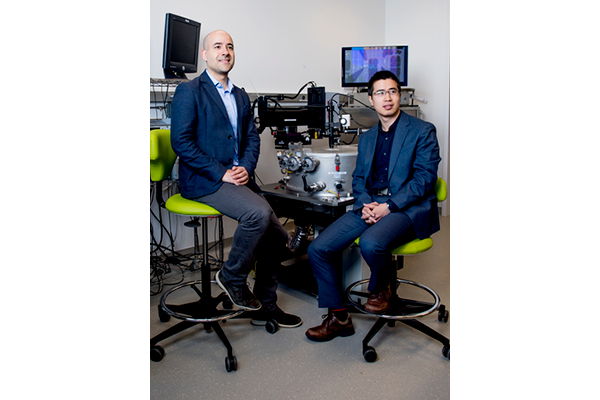Zepsor Technologies Taps Spark Fund to Scale Zero-Power Sensor Solutions

ECE Professor Matteo Rinaldi and Associate Research Professor Zhenyun Qian founded Zepsor Technologies, an innovative tech company that has developed a zero-power sensor that could reduce the demand for battery replacements.
This article originally appeared on Northeastern University Center for Research Innovation.
Zepsor Technologies Taps Spark Fund to Scale Zero-Power Sensor Solutions
Born out of Northeastern’s SMART Center, Zepsor Technologies is redefining the future of sensing with zero-power infrared sensors—devices that remain in a low-energy standby mode until activated by the signal they’re designed to detect. Instead of constantly drawing on battery life, Zepsor’s sensors “sleep” until needed, enabling longer-lasting, more sustainable, and scalable sensing systems.
This breakthrough addresses a looming challenge: how to power the projected one trillion connected devices expected to be online by 2035. With support from the CRI and Spark Fund, Zepsor has developed a technology that could significantly reduce global demand for battery replacements, thereby limiting waste, reducing costs, and enabling smart infrastructure at scale.
Led by co-founders Dr. Matteo Rinaldi and Dr. Zhenyun Qian, Zepsor made headlines this fiscal year with a series of major milestones. The team showcased its zero-power presence sensor at CES 2025, capturing interest from industry leaders and media outlets. In April, Zepsor secured new R&D funding from ARPA-E to develop next-generation hydrogen leak detection systems. While just preceding the fiscal year, Zepsor also received the Silicon Catalyst Award in June 2024, providing pre-seed investment and entry into a leading hardware accelerator.
Zepsor’s MEMS-based sensors are already being deployed in presence sensors, flame detectors, and touchless interfaces for everyday hygiene products. By dramatically extending battery lifetimes up to 5 to 10 times longer than conventional active IR sensors, Zepsor’s approach offers a clear path toward reducing maintenance costs, limiting waste, and enabling reliable sensing for applications where battery replacement is costly or impractical.
The company expects to begin customer sampling later this year, supported by its second batch of foundry-fabricated prototypes. Zepsor is actively engaging original equipment manufacturers (OEMs) across smart hygiene, home automation, and occupancy detection, with additional exploration into consumer electronics, safety systems, and energy-efficient infrastructure.
“Our goal is to remove power as a barrier for sensing at scale,” said Matteo Rinaldi, Co-founder and CEO of Zepsor. “With support from Northeastern and CRI, we’re transforming fundamental research into real products for smart, sustainable infrastructure.”
With support from the CRI and Spark Fund, Zepsor holds an exclusive license to multiple Northeastern patents that enable this new class of event-driven, zero-power MEMS sensors. Zepsor’s path from lab research to spinout was supported by one of CRI’s earliest gap funds and a clear IP strategy to secure foundational patents.
To date, Zepsor has combined competitive federal funding, including NSF, ARPA-E, and DARPA awards, with strategic pre-seed investment from Silicon Catalyst Ventures and Mayfield, supporting both product development and early customer sampling.
Source: Center for Research Innovation
Related Story: These ‘zero-power’ sensors could revolutionize consumer electronics